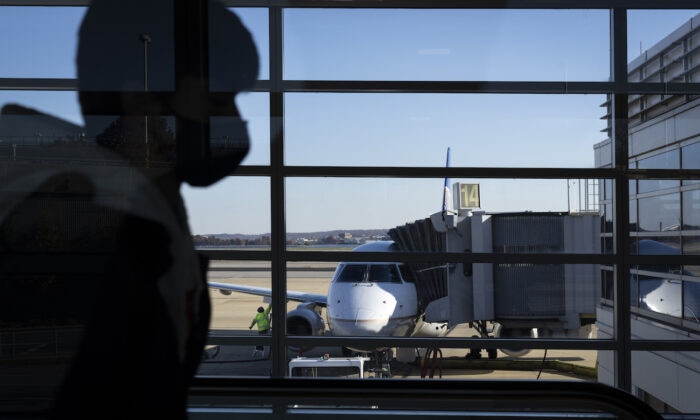The U.S. Transportation Security Administration (TSA) has extended its COVID-19 vaccine proof requirement for non-U.S., nonimmigrant citizens flying to enter the United States, making the United States the only western country and among the few remaining countries in the world still to require such proof for entry.
The latest TSA security directive (pdf) states that effective to at least Jan. 8, 2023, aircraft operators must require each non-U.S., nonimmigrant citizen to present paper or digital documentation for “proof of being fully vaccinated against COVID-19,” or documentation proving the person is excepted from taking the vaccine, before boarding a flight to the United States.
A “nonimmigrant” means not a U.S. citizen, U.S. national, lawful permanent resident, or traveling to the United States on an immigrant visa.
According to the Centers for Disease Control and Prevention (CDC), being fully vaccinated means having had an accepted single-dose vaccine or a second dose of an accepted 2-dose series at least 14 days ago. A booster dose is not needed to meet the requirement.
It comes after the Biden administration in June dropped its requirement for air travelers entering the United States to test negative for COVID-19, meaning a person with the disease could still be allowed into the country, provided they have proof of vaccination.
The latest security directive largely matches that of the previous TSA security directive (pdf) that was made effective from Nov. 8, 2021, and is to expire on Nov. 8, after which the new directive will take effect.
Few Countries Still Require Vaccine Proof
While the vast majority of countries have dropped COVID-19 vaccine proof requirements for entry, the United States and a few other countries around the world continue to require them for non-citizens, with no alternate avenues for the unvaccinated such as requiring proof of immunity against COVID-19, a negative test, or a quarantine period instead.
These other countries include Pakistan, Indonesia, Ghana, and Liberia.
In the latest security directive, the TSA maintained language saying that the policies, alongside the CDC’s technical instructions and President Joe Biden’s Proclamation issued in October 2021, “are intended to limit the risk that COVID-19, including variants of the virus that causes COVID-19, is introduced, transmitted, and spread into and throughout the United States.”
The policies will “advance the safety and security” of travelers, government workers, and air travel industry workers while allowing the world’s economies to recover from the effects of the COVID-19 pandemic, the TSA security directive reads.
Vaccines Do Not Prevent Transmission
COVID-19 policies and restrictions have shifted in recent months in the United States, to no longer differentiate vaccinated and unvaccinated in mitigation measures, amid acknowledgement by officials and the general population that COVID-19 vaccines do not or no longer prevent transmission.
In July, the CDC adjusted its mask guidance to require people to wear masks in some areas even if they are fully vaccinated against the virus that causes the disease. At the time, CDC Director Rochelle Walensky told reporters that new research from several U.S. states and other countries “indicate that on rare occasions some vaccinated people infected with the Delta variant after vaccination may be contagious and spread the virus to others.”
The CDC in early August had made revisions to its COVID-19 prevention guidance such that it no longer differentiates based on a person’s vaccination status, because “breakthrough infections occur, though they are generally mild, and persons who have had COVID-19 but are not vaccinated have some degree of protection against severe illness from their previous infection.”
CDC Director Rochelle Walensky in August had noted that COVID-19 vaccines can no longer prevent transmission. She told CNN in an interview: “Our vaccines are working exceptionally well. They continue to work well for Delta with regard to severe illness and death, they prevent it. But what they can’t do anymore is prevent transmission.”
Waning Efficacy
The COVID-19 vaccines have proven increasingly ineffective to protect against infection and showed waning efficacy in protecting against hospitalization and severe illness amid newly-emerging variants. This prompted the governments of many countries to recommend boosters and subsequent boosters throughout the COVID-19 pandemic.
Meanwhile, the new bivalent boosters from Pfizer-BioNTech and Moderna, which were intended to enhance protection against Omicron and its different subvariants, haven’t been tested in humans at all. While the updated boosters triggered higher levels of antibodies than the old boosters when tested on mice, the trials didn’t provide any efficacy estimates for protection against infection or severe illness.
The CDC and its partner, the U.S. Food and Drug Administration, have aggressively promoted vaccination during the pandemic, even when little evidence supports the vaccines. The agencies have also repeatedly refused to release COVID-19 vaccine safety data, The Epoch Times previously reported.
The Epoch Times has found that officials in the United States are continuing to spread misinformation about COVID-19 vaccines, including unsupported or misleading statements about vaccine effectiveness and safety.
Zachary Stieber and Eva Fu contributed to this report.
















